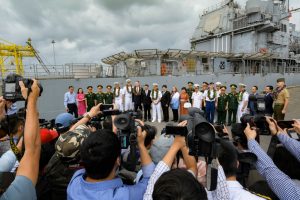Trust can never be earned; it must be given. This is true in all relationships, including geopolitical ones. Vietnam and the United States are commemorating the 25th anniversary of the establishment of diplomatic relations this year. While sailing has not always been smooth, both countries have worked hard to enhance trust. Late last week, both nations took a big step to catapult mutual trust to a new level – and it had China’s attention.
Vietnam hosted the U.S. Navy aircraft carrier Theodore Roosevelt and a ship from its strike group through the weekend at the commercial port of Da Nang. There can be no more powerful symbol of America’s commitment to preserve a free and open Indo-Pacific than the presence of a United States aircraft carrier. The visit comes two years to the day from the historic first post-war aircraft carrier visit to the country. I coordinated the first visit and witnessed how such port calls, if managed correctly, enhance strategic trust.
Hanoi carefully balances its security relations with both Washington and Beijing. The presence of a hundred thousand tons of steel can easily tip the balance and complicate Vietnam’s willingness to welcome future U.S. Navy ship visits. During the March 2018 port call, the U.S. Navy downplayed the ship’s obvious “hard power” capabilities. Instead, we emphasized professional exchanges between cooks and firefighters, and organized band concerts around town and community events at local schools. The visit did nothing to provoke Sino-Vietnamese tensions. Rather, it deepened strategic trust and helped to establish the positive conditions necessary for this year’s event.
The port call of the Theodore Roosevelt has already helped to deepen bilateral trust. Six thousand sailors visiting a nation adjacent to the epicenter of the ongoing coronavirus health crisis certainly stimulated a debate in both Hanoi and Washington about proceeding with the visit. Both countries have legitimate health concerns. For its part, the United States Pacific Fleet has directed its ships to remain at sea for 14 days following a foreign port call in Asia to identify any spread of the contagion. The easiest and safest choice would be to for one side or the other to have postponed this significant event. Mutual willingness to proceed with the visit, however, indicates that the trust between Washington and Hanoi has reached a new level.
On the U.S. side, the visit demonstrated the Navy follows through with its commitments and that the American leadership trusted the Vietnamese authorities to take appropriate measures to protect sailors from the spread of the virus. For Vietnam, it built trust with the senior-most leadership of the country. The approval for an aircraft carrier visit requires a unanimous consensus among Vietnam’s 19-member Politburo. Some Politburo members favor closer relations with the United States, while others fear potential pressure from China. The decision to proceed with the port call empowers the Politburo members who advocated in favor both of this visit and of closer U.S. ties. And it will make similar high-profile events more palatable for the entire Politburo in the future.
China closely monitored this visit. There is nothing more Beijing wants than to push the United States out of the South China Sea. China already claims 90 percent of these strategic waters and is pressing its neighbors to restrict joint ventures with oil companies from outside the region through its Code of Conduct negotiations with ASEAN. Beijing has even proposed it should be notified in advance of military exercises between an ASEAN nation and the United States – and that it should be able to veto the exercise. The carrier port call undermines China’s efforts. The visit conveyed the United States’ enduring support for international norms and standards, promotes the independence of regional partners, and demonstrates the United States’ commitment to maintain its presence in the region.
Beijing may already be posturing for a response. China’s Hainan Maritime Safety Administration announced they would dispatch the research vessel Hai Yang Shi You 719 to conduct a seismic survey near the Paracel Islands, in waters claimed by both China and Vietnam. While the deployment may be for legitimate Chinese commercial interests, China uses such deployments to assert sovereignty and to signal displeasure toward Vietnam. Hanoi will be closely attuned to how and where China deploys this vessel.
China’s message to the region is that the United States is an unreliable partner. ASEAN nations are watching Washington’s actions closely to evaluate the trustworthiness of the United States. The withdrawal from the Trans-Pacific Partnership in 2017, the absence of a top Trump administration official at last November’s ASEAN Plus summit in Thailand, and missed opportunities to halt Chinese armament of artificial islands constructed in the South China Sea contribute to ASEAN’s unease. Moreover, Washington just postponed a special ASEAN-U.S. presidential summit scheduled for mid-March in Las Vegas based on coronavirus concerns.
The port call of the Theodore Roosevelt, however, demonstrated Washington’s commitment to advancing bilateral relations with Vietnam. Its message of reassurance extends far beyond Vietnam’s borders. The visit will influence the strategic calculus of each ASEAN nation as they manage their own relationships with Washington and Beijing. It built trust. Persistent U.S. presence in the region and tailored collaboration with each ASEAN partner will further deepen trust of the United States and will allow America to better advance its strategic interests in Asia.
Captain Christopher Sharman, U.S. Navy, is a National Security Affairs Fellow at the Stanford University Hoover Institution. He previously served as a Navy Attaché in both Vietnam and in China. The views expressed herein are those of the author and do not reflect the official policy or position of the U.S. Navy, U.S. Department of Defense, or the U.S. Government.

































